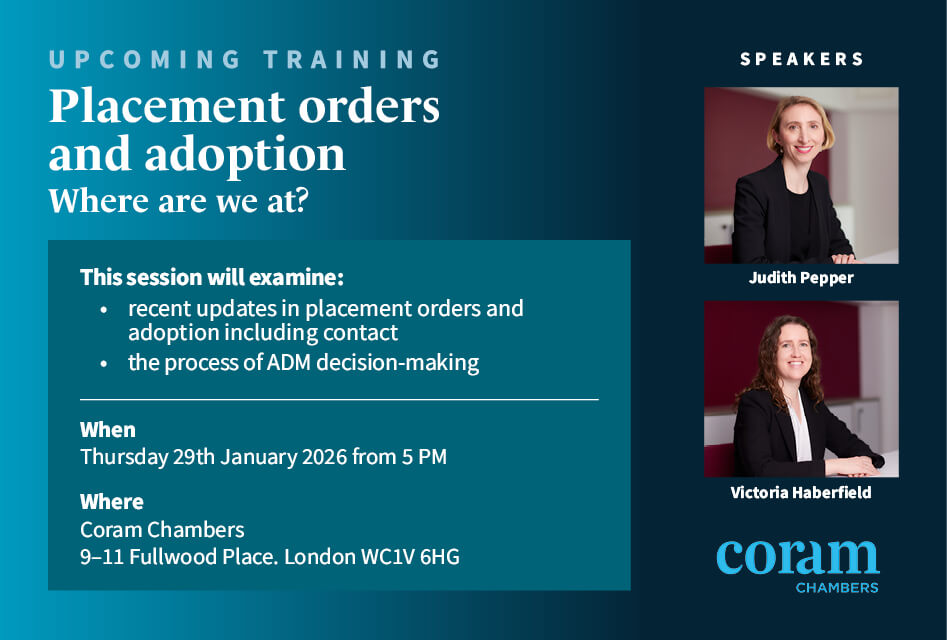Each year, over 3,000 aspiring barristers across the United Kingdom apply for approximately 400 pupillage places. The first hurdle of this gruelling process is the written application, which gives applicants the opportunity to showcase their talents and explain why they are the best candidate for both the individual set and life at the Bar.
At Coram Chambers, we recognise how stressful completing the written application can be. To assist, we have compiled a list of “top ten tips” for applicants, which have been produced with the input of our application markers:
1. Ensure you know what type of chambers you are applying for: this seems self-evident but every year we receive applications from candidates telling us how keen they are to pursue a career in immigration or defend innocent defendants in criminal trials. It may be that the candidate has not completed adequate research or has merely cut and pasted their answers from one application to another. Either way, it results in an automatic rejection.
2. Proofread, proofread, and then proofread again: it can be very easy to make grammatical and spelling errors when you are filling out multiple applications in a tight timeframe. However, it does not instil confidence in the marker when an application is filled with sloppy mistakes, and we do deduct points for this from your overall score. Ask someone who knows nothing about the law – a parent, a friend, a third cousin twice removed – to read through your application with a fresh pair of eyes. It could be the difference between pupillage or another year of applications.
3. Err on the side of formal: as with any job application, your answers are being considered by your future colleagues, not your friends. Slang, textspeak, and other informal language do not have a place in a pupillage application, especially when we are considering your capacity for written advocacy. Save it for the pub. On a related note, it is a good rule of thumb not to reference television shows as the reason you want to be a barrister. Sadly, the life at the Bar is not as glamorous as an episode of Silks.
4. Do not cut and paste across applications: it might be tempting when you are applying for multiple family law sets to simply cut and paste your answers across all of the applications; however, it is very obvious to us when you do so. We genuinely want to know about you and your suitability for our set; stock answers do not assist with this. At the very least, re-write repeated boxes for each application, even if the point is the same.
5. Answer the question being asked: this is advice that we commonly give to clients when they give oral evidence at court and it applies here. Read the question carefully and answer it as directly and succinctly as possible. Your answer not only provides us with the information that we need, but also gives us insight into your ability to focus your arguments.
6. Relate your answers back to the purpose of the application: we appreciate that not everything that you have accomplished will be directly related to a career at the Bar and indeed, it would make for a very one-dimensional candidate! However, you need to demonstrate why any non-legal experiences or accolades support your desire and ability to become a successful barrister. Whilst it might be very interesting that you led a group of students on a trek through the Himalayas or won a gold medal rowing for Britain in the Olympics in 2016, we need to know what skills these experiences afforded you that are transferrable to the Bar.
7. Be selective in what you include: we provide additional space at the end of the application to expand on any answers, but it does not mean that you have to use it. You do not get extra marks for the amount of information that you include! As per the previous tip, we are only interested in the facts that you think that we need in order to make a determination. A good barrister should know how to consider a large amount of information and distil it down to those points that are persuasive so this is good practice for your future career.
8. Do the research: when you are explaining why you want to do pupillage at Coram, look beyond the first page of our website. We often receive generic answers that could be applied to any one of the existing family sets. We want to know if you understand what makes us unique and why that appeals to you (if it even does). Dig deeper.
9. Structure your essay: internal structure is important for most of the questions in the application but particularly for the essay portion. Identify the key points that you want to make and draft an outline before you start writing the essay itself. Signposting can be very helpful but is not essential. This is your chance to show us that you can make a persuasive argument; not write a stream-of-consciousness narrative.
10. Sell yourself: every job application, whether for pupillage, prime minister or stocking shelves at Sainsbury’s, is about selling yourself. This may not come naturally to you but it is integral that you highlight your strengths. The only information that we will base our decision on is the information that you provide us with. In such a competitive environment, your application comes down to a single question: why you?
The above tips will be obvious to some aspiring barristers; less obvious to others. Whatever category you fall into, good luck with the application process. And finally, the most important tip: don’t miss the deadline of 11:00am on 8 February 2021! To read more about applying for pupillage at Coram, please click here.


